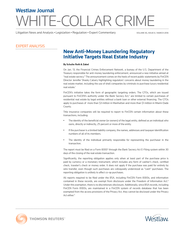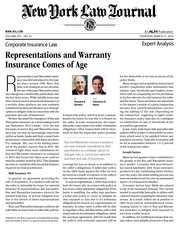UK Companies and LLPs Affected by New Provisions of the ‘People with Significant Control’ Regime – April 12, 2016
Schulte Roth & Zabel
Description
VI. Defaults
http://www.srz.com/
Failure by a relevant company or LLP to take reasonable steps to identify its PSCs is a criminal offence.
The punishment (applicable to both the company and
any ofï¬cer in default) is an unlimited ï¬ne and/or two
years’ imprisonment.
The default provisions for persons to whom a notice
is sent by a relevant company or LLP are more complex. If default is made on a notice issued by a relevant
company or LLP, that company or LLP may issue a
‘warning notice’, and if, after a one-month period, the
default continues, the company or LLP may issue a
‘restrictions notice’. A restrictions notice has the key
effects of prohibiting transfers, prohibiting the exercise of rights attaching to the relevant shares or interest, and prohibiting distributions or payments on the
relevant shares (except on liquidation).11 A restrictions notice must be withdrawn by the relevant company or LLP if: (1) the original notice is complied
with; (2) it is satisï¬ed that there is a valid reason justifying the default; or (3) it discovers that a third party’s
rights are being unfairly affected.
Separately, if a person to whom a notice is sent by a
relevant company or LLP fails to comply with that
notice, or knowingly or recklessly makes a statement
which is false in a material particular, or if a PSC fails
in its own duty of disclosure described above, it commits a criminal offence, for which the punishment is
again an unlimited ï¬ne and/or two years’ imprisonment.
Jim McNally is a partner and Anthony Lombardi is an associate
at Schulte Roth & Zabel.
They can be contacted at: jim.mcnally@srz.com; and anthony.lombardi@srz.com. 4 04/16 Copyright NOTES 1 It is anticipated that Scottish limited partnerships will be brought within the scope of the PSC Regime at a later date. 2 See the SRZ Brieï¬ng ‘Viewing the Shareholder Register’. 3 See the SRZ Brieï¬ng ‘FCA Rules on Trade Reporting’. 4 Similarly, companies with voting shares admitted to trading on a European Economic Area regulated market (excluding those in the United Kingdom) or on certain markets in Switzerland, the United States, Japan and Israel are not subject to the PSC Regime. 5 Further statutory guidance has been issued regarding the meaning of ‘exercising signiï¬cant influence or control’ as relevant for conditions 4. and 5.. In short, a person will be generally deemed to have signiï¬cant influence in circumstances where they can ensure that the company or LLP adopts those policies or activities required by that person. A person will be deemed to have ‘control’ if they have the power to direct the policies and activities of the relevant company or LLP. 6 A legal entity will only be registrable itself if it comes within the deï¬nition of a person with signiï¬cant control over the company if it had been an individual and it is subject to its own disclosure requirements (i.e.
if it is a relevant U.K. company or LLP or subject to the DTR regime). 7 The statutory guidance referred to in endnote 10 below includes speciï¬c guidance for what should be included on the PSC Register in circumstances where: (1) the company or LLP has no PSCs; (2) there are unidentiï¬ed PSCs; (3) there are unconï¬rmed particulars for PSCs; and (4) the company or LLP is still taking reasonable steps to ascertain certain details regarding its PSCs. 8 There are some transitional provisions for those PSCs potentially falling into this category on April 6, 2016 if they apply for their information to be protected before June 30, 2016. 9 There are special rules for PSCs who only hold their interests through one or more legal entities, each of which they have signiï¬cant control over. 10 See Annex 3 of the guidance document, at https://www.gov.uk/ government/uploads/system/uploads/attachment_data/ï¬le/515720/ Non-statutory_guidance_for_companies__LLPs_and_SEsv4.pdf 11 No court order is required for a restrictions notice to have effect (unlike under the similar regime for U.K. public companies under Part 22 of the CA 2006, as referred to above). ஽ 2016 by The Bureau of National Affairs, Inc. TPETS ISSN 1754-1646 .
They can be contacted at: jim.mcnally@srz.com; and anthony.lombardi@srz.com. 4 04/16 Copyright NOTES 1 It is anticipated that Scottish limited partnerships will be brought within the scope of the PSC Regime at a later date. 2 See the SRZ Brieï¬ng ‘Viewing the Shareholder Register’. 3 See the SRZ Brieï¬ng ‘FCA Rules on Trade Reporting’. 4 Similarly, companies with voting shares admitted to trading on a European Economic Area regulated market (excluding those in the United Kingdom) or on certain markets in Switzerland, the United States, Japan and Israel are not subject to the PSC Regime. 5 Further statutory guidance has been issued regarding the meaning of ‘exercising signiï¬cant influence or control’ as relevant for conditions 4. and 5.. In short, a person will be generally deemed to have signiï¬cant influence in circumstances where they can ensure that the company or LLP adopts those policies or activities required by that person. A person will be deemed to have ‘control’ if they have the power to direct the policies and activities of the relevant company or LLP. 6 A legal entity will only be registrable itself if it comes within the deï¬nition of a person with signiï¬cant control over the company if it had been an individual and it is subject to its own disclosure requirements (i.e.
if it is a relevant U.K. company or LLP or subject to the DTR regime). 7 The statutory guidance referred to in endnote 10 below includes speciï¬c guidance for what should be included on the PSC Register in circumstances where: (1) the company or LLP has no PSCs; (2) there are unidentiï¬ed PSCs; (3) there are unconï¬rmed particulars for PSCs; and (4) the company or LLP is still taking reasonable steps to ascertain certain details regarding its PSCs. 8 There are some transitional provisions for those PSCs potentially falling into this category on April 6, 2016 if they apply for their information to be protected before June 30, 2016. 9 There are special rules for PSCs who only hold their interests through one or more legal entities, each of which they have signiï¬cant control over. 10 See Annex 3 of the guidance document, at https://www.gov.uk/ government/uploads/system/uploads/attachment_data/ï¬le/515720/ Non-statutory_guidance_for_companies__LLPs_and_SEsv4.pdf 11 No court order is required for a restrictions notice to have effect (unlike under the similar regime for U.K. public companies under Part 22 of the CA 2006, as referred to above). ஽ 2016 by The Bureau of National Affairs, Inc. TPETS ISSN 1754-1646 .









